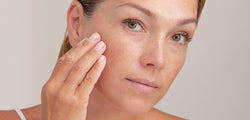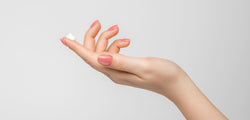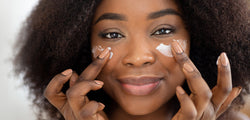
How to Use Retinol?
Table of Contents:
Retinol is, without a shred of doubt, the holy grail of beauty and skincare ingredients. You'll be hard pressed to come across a skincare product worth its weight in gold that does not contain retinol (or a derivative of it) as one of the active ingredients. Such is the functionality and significance that this vitamin A-extracted nutrient commands in dermatological circles. In fact, there's no shortage of skincare gurus who would swear by its ability to improve skin texture, fade dark spots and boost collagen production. And this explains why retinol usage has gone remarkably over the past few years.
To be fair, the list of proven benefits that retinol boasts is unbearingly long. Here are some of them, just to give you an idea of what all the fuss is all about.
- Helps unclog and unblock skin pores thereby preventing the onset of acne
- It improves the appearance of skin imperfections such as hyperpigmentation and blemishes
- Widely involved in the treatment of acne
- Reduces the conspicuousness of wrinkles and acne
- Boosts skin hydration especially in people with extra-oily skin
- Exfoliates and smoothes out the outermost layer of the skin
- Retinol usage is also believed to thicken the dermis (the layer below the epidermis) progressively, thereby making one's face look more youthful and healthier over time.
Now, as much as retinol sounds like the panacea to all our skin woes, this powerhouse is not without its fair share of pitfalls and side effects. That's why it is extremely important to know how to use retinol correctly to avoid worsening your skin problems.
Is Retinol Safe?

So, is retinol safe? Truth be told, retinol is relatively safe for use with most skins when used properly and as recommended. However, that skin-friendliness goes out of the window when you attempt to use it contrary to the dermatologist's instructions.
But, somebody may ask, "Can retinol damage skin if you use it correctly?" Well, not unless your skin has a rare retinol sensitivity that triggers a special immune response to it, this is one of the mildest skincare ingredients you can come across. If anything, unlike its bigger and more potent brother (prescription-strength retinoids), side effects are relatively rare and are more of the exception than the norm.
Another way of lessening your risk of suffering from side effects of this vitamin A derivative is by restricting your use to retinol creams that are specially concocted for use by all skin types. A good example in this department is Maryann Retinol Cream which buffers the otherwise dehydrating and intense retinol with a number of hydrating ingredients such as hyaluronic acid.
Starting Retinol
Contrary to the common misconception that retinol use is only reserved to people who are well over the hill and teenagers battling acne, you can start using this skincare talisman at any stage of your life. Anecdotal evidence shows that the earlier you start using retinol, the better the anti-aging effects will be in the long run.
Starting retinol at 22, for instance, can delay the onset of wrinkles and fine lines further than it would have been the case if you didn't use it at all. It's one of the many tricks that A-list celebrities and public figures use to combat the tell-tale signs of aging for as long as possible.
On the other hand, it is never too late to start taking care of your skin. Starting retinol at age 30, for example, has been proven to be beneficial in reducing the signs of premature aging that could be already creeping in, such as fine lines, forehead creases and crows feet. Just like the way starting retinol in 50s is miles better than never starting at all.
When To Use Retinol In Routine?
Now that you have heeded our advice and decided to incorporate retinol into your skincare regimen, you may be stuck on when to use retinol in routine. Don't worry, this is expected. Integrating this skincare element into your beauty regimen can seem intimidating at first, and you will be wrought with endless questions such as, 'when should i use a retinol in my skincare routine?' But then again, nobody was born a pro, right?
Firstly, it is important to start slow and give your skin plenty of time to acclimatize to it. Most people will kickstart this adjustment by using it just twice a week while looking for any signs of intolerance such as flakiness and redness. You can then bump that up to every 48 hours as you gradually adjust to it.
Secondly, retinol is particularly sensitive to light. Cue, the dark packaging that it comes with or the opaque tube. So, as expected, you should only use it at night just before bed to prevent unnecessary damage by the sun's UV rays.
Lastly, mix it up with your lotion or skin moisturizer to temper its intensity a little bit and make it a little bit gentler on the skin. You should never start by applying it directly on your face but you can transition to that over time.
How Long Does Retinol Purge Last?

If you have been wondering how long does retinol cream lasts when you apply it, then you will be delighted to know that this magic ingredient has a pretty outstanding half-life. But even then, retinol is not without its downsides. One of them is that the first few weeks of using it can prove to be a challenging and irritating experience. Experts like to refer to it as the 'purge phase' - a sort of an adjustment period where the same acne that you are trying to treat seems to get worse than better. Which, as naturally expected, leads us to the question, how long does retinol purge last?
Well, the purge normally lasts anywhere between two and six weeks. This, of course, will depend on the type of your skin as well as your consistency in adhering to recommended treatment protocol.
Retinol For Dry Skin
Navigating the waters of retinol dry skin can be a little dicey considering that retinol is known to induce temporary dryness even in people with naturally oily skin. Fortunately, there are a few clever ways of managing retinol for dry skin without aggravating it outrightly. One of them is by applying it alongside a reliable moisturizer. The best way, as far as this goes, is applying the moisturizing serum first then slathering on the retinol afterward. This creates a kind of buffering that somehow cancels out the infamous drying and flaking effect that retinol tends to have on sensitive skin.
Using Retinol Under Eyes
Using retinol under eyes is no longer a speciality but now a staple in most skincare circles. It's a good way of stimulating skin-cell turnover and rejuvenating the delicate area underneath your peepers.
That being said, bear in mind that the skin just below your eyes is the thinnest and most fragile on your face. As such, you have to make sure that retinol cream that you are using in this highly delicate area is specially formulated for this. Otherwise, you may end up doing more harm than good.
A perfect example of an ideal retinol-powered under eye cream is Maryann Organic Eye Cream. Such an under eye dark circle fighting cream employs this superstar ingredient surrounded by layers of encapsulating hydrating ingredients to make it easier for your skin to tolerate it.
Retinol: Before or After Moisturizer?

As we have already narrowed down, you may want to use a moisturizer with retinol especially if you are a beginner. But the real question is, should I use retinol before or after moisturizer?
Ideally, you should use a moisturizer after retinol. The reason here being that the whole point of adding a hydrating serum in this regimen is to give your skin a much-needed buffer that allows it to tolerate the retinol better. As such, applying the retinol before the moisturizer defeats the idea of using a diluting component in the first place. That aside, you can mix your moisturizer with the retinol before applying them together if you find it convenient that way.
Can You Use Vitamin C With Retinol?
Another query that gets thrown around whenever retinol is mentioned is, "Can you use retinol and vitamin c?'' Long story short, yes you can. There's a catch, nonetheless. Since retinol is sensitive to light, it should only be used at night before bed and vitamin C can then take over during the day. Remember to wear sunscreen while at it.
Can You Use Niacinamide With Retinol?
As much as retinol and niacinamide are often available as separate products, they often can be combined and used as a single skincare product. But if you are using these as separate products it is natural to be accosted with questions like, "Can you mix niacinamide and retinol for yourself at home?" and "Can you use niacinamide with retinol to improve your acne symptoms?"
The accurate answer here is that if you decide to use retinol with niacinamide, then you may want to apply the latter first and then follow it up with retinol. In fact, applying the niacinamide first is believed to be helpful in protecting your skin from the rough edges of retinol especially if you are a beginner.
Can You Mix Glycolic Acid And Retinol?
As much as it is possible to add both retinol and glycolic acid safely into your beauty routine, there are several pointers that you should be aware of. For starters, never use retinol and glycolic acid at the same time. Start by using glycolic acid at least once a week to see how your skin tolerates it. Then adopt a retinol product in the following week and monitor the results. As soon as your skin adjusts to both ingredients you can increase the frequency progressive until the point where you will be alternating between each of these products nightly. That's the long and short answer of the question, "Can you mix glycolic acid and retinol?"
Collagen or Retinol?

Collagen or retinol seems to be present in just every skincare product under the sun. So much, to the point that one may wonder, which between the two works better?
According to top estheticians and dermatologists, both are important and you should find a way of incorporating them into your skincare game. On one hand, retinol is known for its unmatched ability to stimulate the proliferation of new skin cells, something that makes your complexion smoother and less scarred with time. Collagen, on the other side of the spectrum, is responsible for keeping the skin looking young, plump and wrinkle-free. It, in one way or another, gives your skin a temporary fix to common signs of aging.













